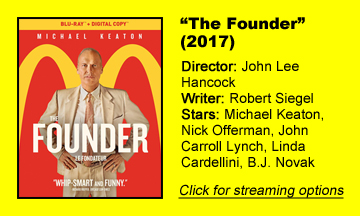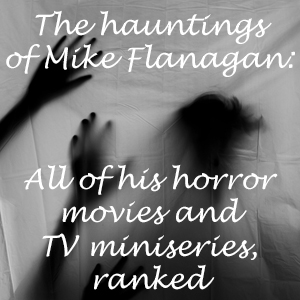In giving one of his many great performances of the 2010s, Michael Keaton brings to life one of the most compelling business stories of the mid-20th century: Ray Kroc’s expansion of McDonald’s from a local into a national enterprise.
Like all great biopics, “The Founder” (2017) – written by Robert Siegel and directed by John Lee Hancock – is fascinating for its contradictions. Kroc made possible a corporation that now does demonstrable good – providing cheap food and entry-level jobs (a significant number of my most successful friends started at “Mickey Dee’s”).
An evolving scheme
Yet Kroc is the villain of “The Founder,” and based on the evidence presented, he should be. Keaton speaks in a nasally, almost sniveling voice at times. But Kroc is almost worth rooting for, because we see his rough start as a traveling salesman from Illinois who peddles multi-mixers that only one restaurant (McDonald’s) wants.
Kroc’s gradually evolving scheme to wrest McDonald’s from its actual founders, California’s McDonald brothers (Nick Offerman’s Dick and John Carroll Lynch’s Mac), is engrossing. Although I always felt bad for the brothers, I couldn’t wait to see what shrewd move Kroc would come up with next.
More broadly, “The Founder” is a bittersweet story of the change in America from mom-and-pop entrepreneurship to chains and big business. Modern Georgia ably stands in for mid-20th century California and the Midwest, and the settings, costumes and music evoke happy days of exciting possibilities.
In a great scene, Ray orders from the San Bernardino McD’s and is baffled by the speed, and the concept of eating out of the wrapper and throwing everything in the garbage afterward.
But steeped as it is in Kroc’s moral wrongness, “The Founder” is not an upbeat film. It’s creepy the way Kroc eyes his friend’s wife, Joan (“Freaks and Geeks’ “ Linda Cardellini); we know he’s going to steal her away and discard his own wife (Laura Dern). It’s also creepy to think of how Joan is drawn to Ray’s power (everyone except Kroc, Mac and Dick are underexplored, though).
Force of will
But the wigginess is an undercurrent; Keaton shows us how force of will wins out, and we almost hate him for doing everything legally, thus not allowing him to hate him more. I kept waiting for Kroc to do something notably sinister, but he’s more of an opportunist than a schemer.
Indeed, the film’s one last knife in the back is made possible by the brothers themselves, as they inexplicably allow their royalty agreement to be done by a handshake deal rather than a written contract.
Early in the film, the brothers’ hard work and ingenuity parallels Kroc’s as they develop what we now know as “fast food” (although it was actually much faster in the 1950s). Yet they become a stark contrast to Ray, holed up in their modest San Bernardino office, dreading phone calls and letters from Ray, who is hopping around the USA opening new McDonald’s locations.
Offerman sounds the same as “Parks and Recreation’s” Ron, but is unrecognizable without the mustache. Dick could outmaneuver anyone … except Kroc. It’s fun to see Lynch, who usually plays bad guys, play softie Mac, who hangs on every word of Dick’s calls with Kroc.
Fascinatingly, Kroc isn’t a genius. In fact, his random run-in with Harry J. Sonneborn (“The Office’s” B.J. Novak, a dead ringer for the real man) is crucial. Kroc had signed a pretty bad franchising contract with the McDonalds, but Sonneborn knows expansion and riches might be found if Kroc’s company buys land and then leases it to McDonald’s franchisees — a grand workaround.
It skims over some details
“The Founder” skims over the pivotal part — Sonneborn bringing together investors – because it’s ultimately a battle of wills and corporate savvy. Once his leasing company becomes bigger and more far-reaching than the brothers’ San Bernardino restaurant, Ray is able to sting little villainies on them.
He calls his company McDonald’s Corporation, which is fraud; he uses concentrated soft serve instead of ice cream, which breaks the brothers’ approval clause. But the brothers can’t afford the court costs, and so “The Founder” hits on a primary reason why American justice favors the rich.
Siegel’s screenplay lags a bit in the middle but leaves us with its most fascinating element, and one I’m not sure how to interpret. Dick asks why Kroc didn’t merely start his own restaurant chain, and Kroc says it’s because he wanted the name “McDonald’s.”
And yet the story shows us that “McDonald’s” wasn’t an automatic winning name out of the gate, and that Kroc didn’t immediately think to (fraudulently) use the name for his own company.
Indeed, “The Founder” (by accident, I think) makes one final point about the randomness of business success. It’s true that Kroc worked as hard as anyone else, only more ruthlessly. But he would’ve crashed and burned if he hadn’t met Sonneborn by chance, and at the precise time at which “McDonald’s” had clicked in the American consciousness as a trusted brand.
Accidentally, “The Founder” is a story about God smiling not on a stupid person, but on a nasty one.



